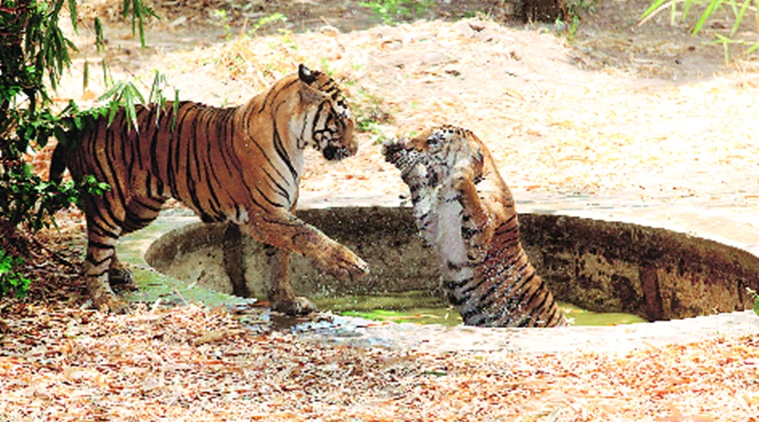
The Indian Express
In Sayajibaug zoo, lockdown has given privacy for tigers to mate
Due to the Covid-19 lockdown, construction work on the new enclosures inside the zoo has been suspended since March end along with the suspension of visitors. Absence of visitors and workers has given the much needed privacy to the animals, especially the big cats that do not usually mate in full public view.
by Aditi RajaIn a water pool inside the open-to-sky area of the tiger enclosure of the iconic Sayajibaug zoo, Dharti the tigress playfully rolled over her back as her partner Paresh circled around her, purred and jumped into the pool, rubbing his face to hers — a rare sight in captivity and especially for the zoo, which has been trying to have its female tigers conceive since the last few years.
Due to the Covid-19 lockdown, construction work on the new enclosures inside the zoo has been suspended since March end along with the suspension of visitors. Absence of visitors and workers has given the much needed privacy to the animals, especially the big cats that do not usually mate in full public view.
The two tigers –Paresh and Dharti –both born in 2006, have not had any offspring so far. While Paresh was brought to Sayajibaug in 2010 from Junagadh zoo, Dharti was born in the Vadodara zoo.
The Sayajibaug zoo has been trying to produce a tiger litter since 2017, when it first sent one female tiger, Pruthvi, to the Surat zoo to have her mate with the male tiger there after approval from the Central Zoo Authority of India (CZA). Pruthvi died of injuries sustained during the interaction with the male tiger, who turned aggressive. Pruthvi was Dharti’s sister and Vadodara’s third tiger. The zoo authorities cautiously brought together Paresh and Dharti about a week ago, once aggression was ruled out.
Zoo curator Pratyush Patankar said, “The two did not show any signs of aggression, which is most important to avoid any tragedies. We already lost Pruthvi in Surat so we were guarded. But Paresh and Dharti seemed compatible. We are hoping that this lockdown will ensure that we have offsprings from them soon. Dharti is the only surviving tigress of her clan now. Her other sister, Bhoomi also died in Rajkot zoo due to snake bite in August 2018 .”
Since the tigers are prone to being aggressive during courtship, the authorities are set to keep a close watch on the process. The zoo is also set to execute an exchange programme for its pair of Asiatic lions to produce a pure breed. Patankar said that the formalities to send the 12-year-old lion to the Rajkot zoo has been completed but has been on hold due to the lockdown.
“Our lion, Kunwar and lioness Gayle haven’t yet reciprocated each other although they have been in the zoo since 2011. They were even brought together from Junagadh zoo together but we never had the opportunity to bring them together due to the lack of space in the enclosures. We were hoping that our revamping would have been complete by April but the Covid-19 outbreak has delayed it further. So, we will bring another lion from Rajkot zoo in exchange to mate with our lioness whenever we are able to proceed with it,” said Patankar.
Vadodara’s zoo is especially keen on having a litter from Kunwar the lion due to its wild lineage. “Kunwar was originally a wild cub, because his mother, who was rescued (in Junagadh) from the wild was already pregnant at that time, according to records. So, we are extremely keen on having him produce at least one set of litter with any other Asiatic lioness. Usually, lions in captivity only mate with other captive lionesses through generations and therefore the cubs do not have any direct wild lineage. The Rajkot zoo is adept at mating lions and we have chosen to have the exchange programme with them,” Patankar said. He added that the aim was to also increase numbers within the zoo. He said, “We need to have more cubs. I have been looking around for suitable tigers in order to have a new gene pool. When such a programme is undertaken involving endangered or Schedule- I animals, it has to be done with the consent of the CZA.”